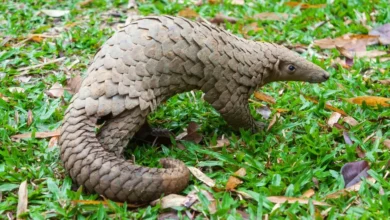How eating insects became a conspiracy theory
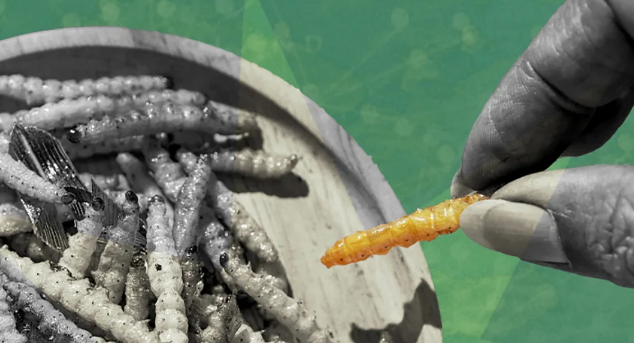
Insect protein is healthy and sustainable. But now it is also at the centre of a far-reaching conspiracy theory.
Throughout human history, insects have been on the menu. One of the earliest known depictions of entomophagy (insect eating) dates as far back as 30,000BC in the ancient cave paintings of Altamira in northern Spain, illustrating the gathering of bees. Today many people in Latin America, Asia and Africa consume insects regularly. In Mexico, for example, boiled and fried grasshoppers, “chapulines”, are a popular bar snack and increasingly served in gourmet restaurants.
But not everyone’s biting. Though insects have long been considered inexpensive, healthy and sustainable sources of protein, they remain largely absent from American and European diets.
In recent years, this reluctance has been exacerbated by a web of conspiracy theories claiming that “global elites” are forcing the public to abandon meat in favour of bugs. This disinformation obscures legitimate scientific research into insects as a source of climate-friendly protein and may hinder the shift towards more sustainable food systems, researchers warn.
Popping up most commonly in the United States and pockets of Europe, “I will not eat the bugs” is a conspiracy theory that alleges that “global elites” will force the ordinary masses to eat bugs under the guise of environmentalism, says disinformation analyst Sara Aniano.
Aniano, who has been researching this theory at the Anti-Defamation League’s Center on Extremism for years, says it neatly fits into existing fears about the “depraved decline of Western civilisation”. What began as a semi-sardonic meme on an online forum has now seeped into the fringes of politics in both Europe and the US.
In the Netherlands, Thierry Baudet, lawmaker and leader of the far-right Forum for Democracy party, gave an anti-European Union (EU) speech in March 2023, yelling, “No way!” as he poured golden mealworms out of a bag. Baudet later posted a photo of that moment on X, with the caption “WE WILL NOT EAT THE BUGS”.
Lega per Salvini Premier, an Italian far-right party, paid for a billboard in Conegliano, Italy, with the words, “Let’s change Europe before it changes us” and the dates of the 2024 EU election – next to a close-up of a person consuming what appears to be a locust, conflating entomophagy with a loss of traditional values. In this imagery, food functions as a provocative harbinger of change, tapping into fears of European cultural erosion.
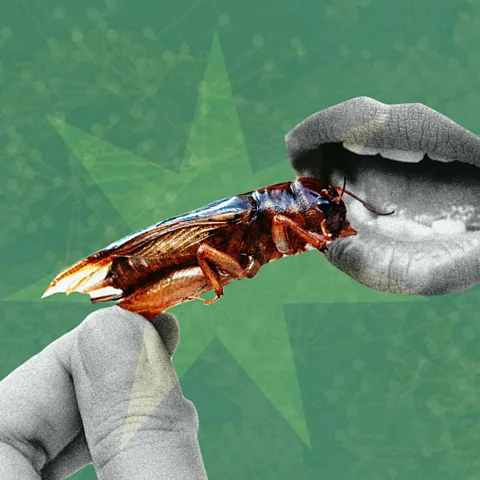
Before he was fired by Fox News in 2023, US talk show host Tucker Carlson’s final special on his streaming show Tucker Carlson Originals, was a half-hour programme called “Let Them Eat Bugs”. Examining climate-driven food policies, Carlson claims “the people in charge” are pushing bugs onto the public’s plate. The episode featured Dutch far-right activist Eva Vlaardingerbroek, who called insect consumption a “compliance test” from an overreaching government and doubled down on her support for farmers’ protests amid proposals of livestock cuts.
“I will not eat the bugs was a meme,” declares Carlson. “Now, it’s a movement.”
Other right-wing American conspiracy theorists like Alex Jones and Candace Owens, along with influencer Jack McGuire have also proliferated the “I will not eat the bugs” conspiracy theory.
But where did this fabricated fear of being force-fed insects originate?
In the spring of 2020, the World Economic Forum (WEF) – the international, non-governmental organisation behind the annual Davos conference in Switzerland – introduced “The Great Reset” initiative, an effort to reduce global inequality and advance environmental initiatives during the Covid-19 pandemic. But to conspiracy theorists, the Davos conference was “proof” that the world’s wealthiest people were trying to use the Covid-19 pandemic as an apparatus to reorganise societies into globalist-totalitarian regimes at the expense of ordinary people, according to the ADL’s Center on Extremism.
“I will not eat the bugs” first appeared on 4chan, an anonymous forum site, as early as August 2019, but its popularity surged after it merged with The Great Reset conspiracy during the Covid-19 pandemic, says Aniano.
In 2021, the WEF published an article saying that insects are more sustainable than meat, both in terms of tackling climate change and food insecurity.
“The bugs conspiracy folds into this idea that to vote for the left is a one-way ticket to the end of modern society as we know it,” says Aniano. A necessity as seemingly simple as food is loaded with markers of culture and identity, she adds.
The EU approved four insects as novel foods in January 2023, allowing limited insect species to be used as ingredients in the EU market under certain conditions of use. The four approved insects are the house cricket, larvae of the grain beetle, the migratory locust and the dried larvae of the flour beetle. That decision caused an outcry on social media.
French right-wing politician Laurent Duplomb criticised the EU’s new food permission, saying: “We cannot allow the French to eat insects without their knowledge.” This false claim suggests that the EU does not require insects to be clearly labelled when they are combined with other ingredients. Under EU law, the presence of insects in a product must be clearly and explicitly declared on its label.
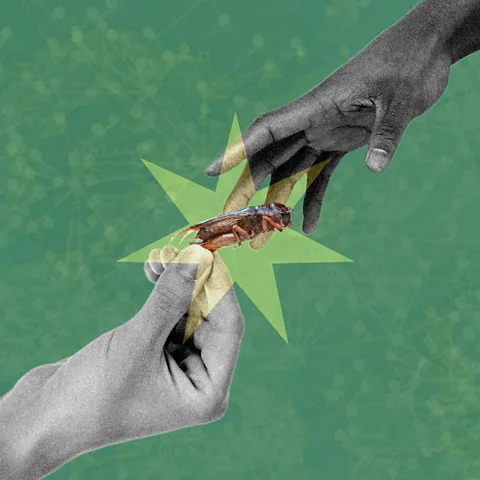
In January 2025, the European Commission approved UV-treated yellow mealworm powder as a novel food. Under these regulations, the EU authorised up to 4% of its use in bread, cheese and pasta – with the requirement that it be clearly listed among the ingredients on product labels. Still, Eurosceptic accounts denounced this approval and regulation. “Out of ecological madness, they are taking the risk of poisoning an entire continent [Europe] in order to compete with livestock farming,” said Florian Philippot, founder of French nationalist party Les Patriotes, in a video on X. He made the false claim that there would be “up to 4g per 100g” of larvae in “our bread, compotes, pastas” making a similar, incorrect claim as Duplomb: that those in power are using climate change as an excuse to make the average European person eat bugs without their consent.
Rhetorically, the phrase “I will not eat the bugs” is compellingly structured as a response to an order – but that order was never given, explains Aniano. The meme’s effectiveness lies in its simplicity, tapping into deeper anxieties about trusting authorities, especially during emergencies like climate change and the Covid-19 pandemic, she adds.
How to combat this disinformation
Conspiracy theories fill an emotional need, says Stephan Lewandowsky, a professor of cognitive science at the University of Bristol in the UK who focuses on science-denial and responses to disinformation. Conspiracy theories tend to emerge from an inclination to make sense of the world, he says.
As the average person navigates uncertainty, particularly during times of crisis, it may be difficult to live in a world that they perceive to be random. Conspiracies provide narrative when, sometimes, there is none, according to research.
Conspiracies are not harmless ornaments in the entertainment landscape – they are deeply troubling, not only for the people that fall victim to them, but also for society at large – Stephen Lewandowsky
Conspiracy theories engender a sense of control in an unpredictable world, explains Lewandowsky. Believing that powerful (albeit malevolent) forces are behind global events can feel more reassuring than accepting randomness, because it insinuates those events could have been prevented. “At least if you think the world is run by a cabal of dark forces, you can imagine that these evil doers could have not done that,” says Lewandowsky.
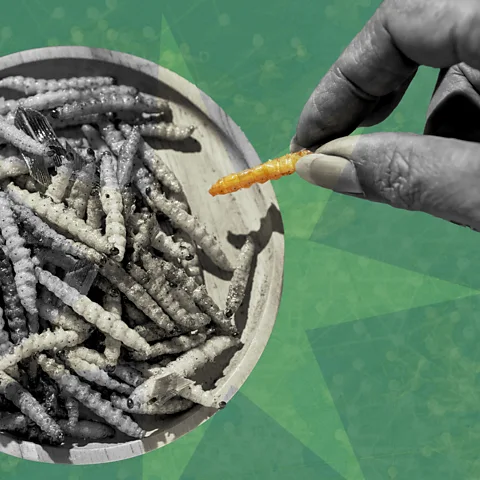
Aniano argues that the baseless “I will not eat the bugs” conspiracy theory reveals a fear: that if oligarchies control our food supply, they control every aspect of our lives. The phrase is often paired with “I will not live in a pod”, evoking a dingy, dystopian vision of the future where liberty and pleasure are stripped away, adds Aniano.
“I will not eat the bugs” is attractive as a conspiracy because the phrase is “funny, amusing and has a tiny twinge of truth”, since insects are, in fact, edible and a good source of protein, says Lewandowsky. Edible insects often contain a higher percentage of protein by weight than many plant-based and some other animal-based protein sources. The protein content of insects can constitute up to 60% of their dry weight, according to the US National Institutes of Health (NIH). Cricket flour, for instance, contains between 46% and 70% protein; the protein content of lean, cooked beef is about 26%.
Specialised AI chatbots may be a promising solution to deradicalise conspiracy theorists, research shows. A new study of an AI called DebunkBot significantly reduced participants’ belief in the specific conspiracy theory they mentioned over the course of three rounds of conversation, with effects lasting for at least two months. “AI is infinitely patient,” Lewandowsky says. “It doesn’t matter how many questions you ask ChatGPT about the Kennedy assassination; it’ll happily and politely answer them. Humans can’t do that.” However, using AI to deflate climate conspiracies comes with its own challenges, as the technology is energy-intensive.
Climate conspiracy theorists – in extreme cases – are challenging to combat because productive intervention requires not just fact-checking, but also addressing the emotional need conspiracy beliefs satisfy, says Lewandowsky.
“You’re not going to be successful if you say, ‘Uncle Bruce, you’re crazy… don’t believe this utter nonsense’,” says Lewandowsky. “But instead, you can ask: ‘What function do your beliefs serve? Why are you believing this?'”
While intervening can be arduous, that doesn’t mean those around conspiracy theorists should give up. Climate disinformation undermines effective environmental action, according to research.
“Even though I have a lot of empathy for individual victims of conspiracy theories, they’re not harmless,” says Lewandowsky. “Conspiracies are not harmless ornaments in the entertainment landscape – they are deeply troubling, not only for the people that fall victim to them, but also for society at large.”
“If a loved one is deep down the rabbit hole and thinks a world government is being created by George Soros and they want us to eat cockroaches, it’s a painful realisation for us to face them,” acknowledges Lewandowsky. “Offer them empathy and engage them in a prolonged deprogramming therapy that involves individual psychological care and persistence, similar to people who exit cults.”
Diverse solutions to food insecurity exist to suit different preferences and cultures, says Jessica Fanzo, director of the Food for Humanity Initiative at Columbia University’s Climate School in New York. Addressing legitimate concerns and providing scientific context can help improve our conversations about what we eat, she says, and avoiding any notion of “forcing” changes is essential.
Confronting climate change and conspiracy theories requires persistence, says Lewandowsky. “It’s not the kind of thing that you can do over a single dinner conversation.”


